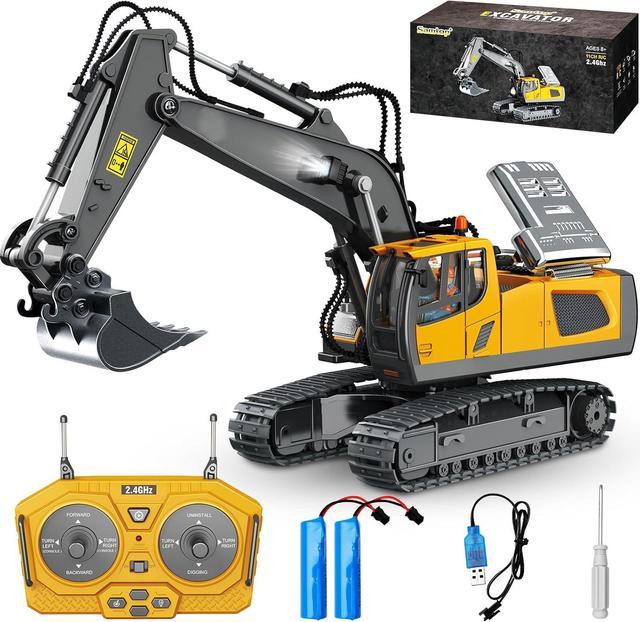Recognizing Just How Excavator Functions and Its Impact on Efficiency
Excavators play a crucial role in building and construction and mining procedures, depending on a complex interaction of hydraulic and mechanical systems. Their capability to carry out a range of jobs depends upon both their design and the modern technology incorporated within. Understanding these elements can considerably influence operational performance and efficiency. As developments remain to improve the market, one must take into consideration exactly how these adjustments will certainly affect future practices and performance.
The Basics of Excavator Mechanics

The Function of Hydraulic Systems in Excavators
At the heart of excavator operation lies the hydraulic system, which plays a crucial duty in powering the machine's features and activities. This system makes use of pressurized hydraulic liquid to move power, enabling various activities such as moving, digging, and lifting. By utilizing the concepts of hydraulics, excavators can do jobs with impressive accuracy and pressure, improving overall operational efficiency.The hydraulic system consists of essential components, including cyndrical tubes, pumps, and valves, which collaborate to regulate the circulation and instructions of the fluid. When the operator engages the controls, the hydraulic fluid is directed to particular cyndrical tubes, equating the operator's commands right into physical activity. This mechanism permits responsive and smooth activities, which are essential in construction and excavation settings. double e volvo rc excavator. The effectiveness of the hydraulic system straight influences the performance and flexibility of the excavator, making it an important component in modern-day excavation procedures
Key Parts of an Excavator
Understanding the essential components of an excavator is crucial for understanding how this effective device operates. An excavator is composed of several considerable aspects, consisting of the undercarriage, home, boom, bucket, and arm. The undercarriage offers stability and movement, frequently including tracks or wheels to browse various terrains. Your house contains the engine and hydraulic systems, permitting the driver to control motion and power the equipment. The boom extends from your home, making it possible for upright reach, while the arm links to the pail, promoting digging and lifting operations.Additionally, the taxicab houses the operator, geared up with controls for exact handling. Each of these elements plays an essential function in the excavator's overall capability, adding to its performance and performance on building websites. Recognizing these components assists in enhancing and maintaining excavator efficiency, ensuring jobs are finished safely and properly.
Add-on Adaptability and Its Advantages
Accessory versatility is a necessary element of excavators, allowing operators to switch between different tools tailored for details jobs. This versatility not just improves job efficiency however also adds to cost-effectiveness by lowering the need for several equipments. Recognizing the various sorts of add-ons offered can considerably affect the total performance and capability of an excavator on work websites.
Kinds of Accessories
While excavators are primarily acknowledged for their digging capacities, their real adaptability exists in the vast range of attachments available. These add-ons enhance the excavator's functionality, permitting it to perform numerous jobs beyond excavation. Usual attachments consist of containers (for digging and scooping), hydraulic thumbs (for grasping products), and augers (for drilling holes) Grapples are made use of for moving and managing debris, while rippers can break up tough surfaces. Various other specialized add-ons, such as plates and plows, enable excavators to adjust to details task requirements. This diversity not just raises the equipment's energy throughout different markets, including landscaping, construction, and demolition, however additionally permits operators to customize their devices to satisfy specific project demands successfully.
Raised Job Efficiency
Taking full advantage of task efficiency is a primary advantage of utilizing numerous excavator attachments. Various add-ons enable an excavator to do numerous tasks without requiring to switch over devices, conserving beneficial time and labor. Making use of a hydraulic hammer can break concrete while a pail accessory can excavate soil, allowing a seamless operations. This convenience minimizes downtime connected with tools modifications and enhances productivity on-site. Furthermore, specialized add-ons improve precision in tasks such as grading or landscape design, resulting in better outcomes. The capacity to adapt to numerous task requirements not only enhances procedures yet additionally decreases the need for additional machinery, making sure that tasks are completed promptly and successfully. Generally, accessory adaptability substantially adds to increased job performance in excavation job.
Cost-Effectiveness and Convenience
Cost-effectiveness is a considerable advantage of making use of flexible excavator accessories. These accessories permit a single excavator to do several jobs, lowering the need for extra machinery and labor - double e volvo rc excavator. By switching in between buckets, hammers, and grapples, drivers can take on various tasks, from excavating to demolition, thus making the most of tools usage. This flexibility not just reduces functional costs however additionally minimizes downtime linked with changing tools. Additionally, the capacity to tailor excavators with specialized accessories improves productivity, as they can effectively deal with diverse tasks according to task needs. To wrap up, the mix of cost-effectiveness and flexibility in excavator add-ons adds to boosted functional performance and resource allotment in construction and excavation projects

Advanced Modern Technology in Modern Excavators
Modern excavators are increasingly geared up with advanced innovation that changes excavation procedures. Automation simplifies operations, while boosted gas effectiveness reduces functional prices. Additionally, clever control systems improve accuracy and safety, marking a considerable evolution in excavation tools.
Automation in Excavation Processes
As excavation modern technology progresses, automation has actually arised as a vital element in improving efficiency and precision on task websites. Modern excavators are outfitted with sophisticated automated systems that assist in tasks such as grading, excavating, and trenching with minimal operator intervention. These systems use sensing units, GPS, and maker learning formulas to ensure accurate positioning and depth control, greatly minimizing the margin for mistake. Additionally, automation permits operators to focus on strategic Click Here decision-making as opposed to hand-operated controls, resulting in boosted productivity in general. Such innovations not just enhance operations yet likewise improve safety by minimizing human error in complex procedures. Consequently, the integration of automation in excavation procedures represents a significant development in building technology, driving the market in the direction of greater efficiency and efficiency.
Improved Gas Efficiency
Advancements in technology have additionally caused substantial enhancements in gas efficiency for modern excavators. Modern equipments are equipped with innovative engines that optimize power result while decreasing gas usage. These engines use cutting-edge combustion modern technologies, such as turbocharging and direct fuel injection, to improve performance and efficiency. Additionally, lightweight materials in building lower overall weight, permitting less power expense throughout operation. The introduction of variable speed controls enables drivers to change engine performance according to particular tasks, further reducing gas usage. Consequently, these improvements not just reduced functional costs however also add to environmental sustainability by minimizing discharges. Generally, improved gas effectiveness in excavators is a necessary advancement that bolsters productivity and economic practicality in the construction market.
Smart Control Solution
While operators navigate increasingly intricate task sites, wise control systems in excavators have emerged as vital tools for improving effectiveness and accuracy. These innovative technologies make use of sensors and formulas to check various specifications such as lots weight, terrain conditions, and operational efficiency. By immediately adjusting hydraulic features, smart systems maximize maker efficiency, resulting in boosted efficiency and minimized wear on parts. Furthermore, operators gain from user-friendly user interfaces that offer real-time feedback and diagnostics, enabling educated decision-making. This combination of innovation not only improves procedures yet also minimizes human error, adding to more secure workplace. As the building and construction market proceeds this hyperlink to advance, smart control systems will certainly play a vital role in shaping the future of excavator performance and efficiency.
Enhancing Functional Efficiency With Excavators
Excavators play a vital duty in boosting functional performance throughout numerous building and construction and excavation tasks. Their convenience allows for numerous tasks, consisting of training, product, and digging handling, which simplifies process and reduces the requirement for extra devices. With powerful hydraulic systems, excavators can carry out durable jobs with precision, substantially lowering the time needed to complete tasks. The combination of sophisticated modern technology, such as GPS and automated controls, better optimizes their operation, allowing drivers to accomplish higher accuracy and decrease product waste. Additionally, contemporary excavators are created to consume much less gas and minimize emissions, contributing to both cost financial savings and ecological sustainability. By making use of excavators efficiently, construction teams can boost efficiency, meet task due dates, and improve total site monitoring. This multifunctionality and efficiency make excavators crucial devices in the contemporary building and construction landscape.
The Future of Excavators in Building and Mining Industries
As the building and construction and mining markets develop, the future of excavators is poised for substantial makeover driven by technological innovation and changing functional demands. Advancements in automation and expert system are reshaping excavator abilities, enabling enhanced precision and efficiency in operations. Self-governing excavators are emerging, lowering the requirement for human intervention and reducing the danger of accidents.Moreover, the combination of telematics and IoT modern technology allows real-time monitoring of maker performance and predictive maintenance, enhancing uptime. Environment-friendly styles, including hybrid and electric versions, are getting traction, lining up with sustainability objectives within the industry.Additionally, the use of sophisticated materials and lighter designs improves gas efficiency while maintaining performance standards. As these fads progression, excavators will play a vital duty in fulfilling the enhancing needs for productivity and Recommended Reading safety and security in building and mining, eventually transforming operational landscapes.
Often Asked Questions
Just How Do Climate Condition Influence Excavator Efficiency?

Weather considerably affect excavator efficiency, as rainfall and mud can hinder traction and security, while extreme temperature levels might impact hydraulic systems. Operators needs to adapt to these variables to assure ideal functionality and safety and security throughout operations.
What Precaution Should Operators Follow While Making Use Of Excavators?
Safety and security actions for excavator operators consist of using appropriate individual safety tools, carrying out pre-operation inspections, ensuring proper interaction with ground employees, preserving a secure distance from overhead risks, and sticking to well-known operational methods to avoid crashes.
Just How Usually Should Excavators Be Maintained for Optimum Performance?
Excavators ought to be maintained regularly to guarantee peak performance, normally every 250 operating hours or as defined by the producer. Regular checks enhance reliability, prevent unexpected failures, and prolong the life expectancy of the tools.
What Is the Average Life-span of an Excavator?
The ordinary life-span of an excavator usually ranges from 10,000 to 15,000 hours of operation. Elements influencing durability include maintenance techniques, running problems, and the top quality of the device itself, influencing total efficiency and performance.

Can Excavators Operate Irregular Terrain Properly?
Excavators can operate effectively on uneven surface because of their expressed styles and adjustable tracks. These functions enable them to preserve stability and grip, allowing reliable operation in tough settings frequently experienced in building and construction and landscape design projects. Each of these components plays a crucial role in the excavator's general functionality, contributing to its efficiency and efficiency on construction sites. Making best use of task performance is a primary benefit of using various excavator add-ons. While drivers browse increasingly complicated job sites, wise control systems in excavators have actually arised as important devices for improving efficiency and precision. Excavators play a necessary function in boosting functional effectiveness throughout various construction and excavation tasks. Advancements in automation and artificial intelligence are improving excavator capabilities, enabling for boosted accuracy and efficiency in operations.
Comments on “10 Things to Consider Before Purchasing a remote control excavator for Your Company”